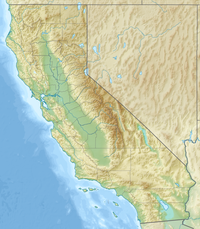Pisgah Crater
| Pisgah Crater | |
|---|---|
 |
|
| Highest point | |
| Elevation | 2,545 ft (776 m) NAVD 88 |
| Prominence | 353 ft (108 m) |
| Coordinates | 34°44′47″N 116°22′30″W / 34.7463888°N 116.375°WCoordinates: 34°44′47″N 116°22′30″W / 34.7463888°N 116.375°W |
| Geography | |
| Geology | |
| Mountain type | Cinder Cone |
Pisgah Crater, or Pisgah Volcano, is a young volcanic cinder cone rising above a lava plain in the Mojave Desert, between Barstow and Needles, California in San Bernardino County, California. The volcanic peak is around 2.5 miles (4.0 km) south of historic U.S. Route 66-National Old Trails Highway and of Interstate 40, and west of the town of Ludlow. The volcano had a historic elevation of 2,638 feet (804 m), but has been reduced to 2,545 feet (776 m) due to mining.
The volcano was the site of the Mount Pisgah Volcanic Cinders Mine, a cinder quarry that produced pumice for commercial use, the primary end product being railroad ballast for the Santa Fe Railroad. The mountain is currently owned by Can-Cal Resources Limited, a Canadian company specializing in exploration of precious minerals in California.
Mining has had a severe environmental impact; the top of the mountain has been removed and the sides of this historically symmertrical mountain have been scoured into an irregular shape. The mountain is still occasionally quarried for various cinder products, and sand from the mountain was used to depict the black sands of Iwo Jima in the film Letters from Iwo Jima.
Currently, the crater stands 98 meters (321 feet) above the surrounding High Desert terrain, and has a base diameter of 488 meters (1,600 feet). It has lost much of its original cinder cone shape to ongoing aggregate mining operations, in addition to minor natural erosion.
The mountain contains a large number of lava tubes, which are frequented by cavers. The most well known cave is the 1,300-foot (400 m)-long SPJ Cave.
...
Wikipedia


